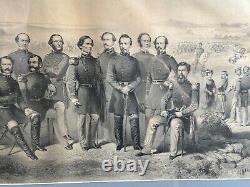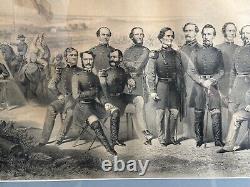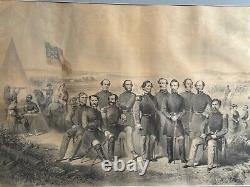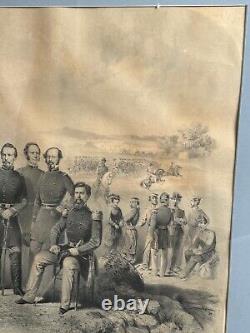
- Index
- Binding
- Conflict
- Industry
- Signed
- Signed By
- Absalom Baird (4)
- Ambrose Burnside (7)
- Charles Devens (2)
- Doris Kearns Goodwin (2)
- Frederick Phisterer (3)
- General Fitzhugh Lee (2)
- Henry Mizner (3)
- Jack Davis (4)
- John A. Dix (5)
- John Geary (2)
- Nathaniel Banks (2)
- Neal Dow (3)
- Nelson A. Miles (2)
- Oliver O Howard (2)
- P.g.t. Beauregard (2)
- Philip Sheridan (3)
- Robert Anderson (18)
- Sitter (17)
- Ulysses S. Grant (2)
- William T. Sherman (2)
- ... (4119)
- Theme
- Americana (9)
- Antique (2)
- Army (3)
- Art (5)
- Celebrities (2)
- Civil War (11)
- Civil War General (2)
- Conflicts & Wars (7)
- Cosplay (2)
- History (11)
- Man, Portrait (2)
- Militaria (1137)
- Militaria, People (5)
- Militaria, Portrait (4)
- Military (2)
- Military & Adventure (13)
- Politics (6)
- Portrait (30)
- Portrait, Man (22)
- ... (2931)
Military CIVIL War 1861 Jefferson Davis Generals Of The Confederate Army















Mathew Brady Studio, active 1844 - 1894 (Photographer). Leonidas Polk, 10 Apr 1806 - 14 Jun 1864. John Bankhead Magruder, 01 May 1807 - 18 Feb 1871.
Thomas Jefferson Simmons, 1837 - 1905. George Nichols Hollins, 1799 - 1878. Benjamin McCulloch, 11 Nov 1811 - 7 Mar 1862. Jefferson Davis, 3 Jun 1808 - 6 Dec 1889.
Robert Edward Lee, 19 Jan 1807 - 12 Oct 1870. Pierre Gustave Toutant Beauregard, 28 May 1818 - 20 Feb 1893. Sterling Price, 20 Sep 1809 - 29 Sep 1867. Image: 43.3 × 68.7 cm (17 1/16 × 27 1/16).
Sheet: 43.3 × 68.7 cm (17 1/16 × 27 1/16). President of the Confederate States. February 22, 1862 - May 5, 1865. Provisional: February 18, 1861 - February 22, 1862. March 4, 1857 - January 21, 1861.
August 10, 1847 - September 23, 1851. 23rd United States Secretary of War. March 7, 1853 - March 4, 1857. From Mississippi's at-large district. December 8, 1845 - October 28, 1846. December 6, 1889 (aged 81). United States Military Academy (BS). Battle of Buena Vista (WIA). Davis (June 3, 1808 - December 6, 1889) was an American politician who served as the first and only president of the Confederate States from 1861 to 1865.He represented Mississippi in the United States Senate and the House of Representatives as a member of the Democratic Party before the American Civil War. He was the United States Secretary of War from 1853 to 1857.
Davis, the youngest of ten children, was born in Fairview, Kentucky, but spent most of his childhood in Wilkinson County, Mississippi. His eldest brother Joseph Emory Davis secured the younger Davis's appointment to the United States Military Academy. Upon graduating, he served six years as a lieutenant in the United States Army. After leaving the army in 1835, Davis married Sarah Knox Taylor, daughter of general and future President Zachary Taylor.
Sarah died from malaria three months after the wedding. Davis became a cotton planter, building Brierfield Plantation in Mississippi on his brother Joseph's land and eventually owning as many as 113 slaves. In 1845, Davis married Varina Howell. During the same year, he was elected to the United States House of Representatives, serving for one year. From 1846 to 1847, he fought in the Mexican-American War as the colonel of a volunteer regiment.
He was appointed to the United States Senate in 1847, resigning to unsuccessfully run as governor of Mississippi. In 1853, President Franklin Pierce appointed him Secretary of War. He resigned in 1861 when Mississippi seceded from the United States.
During the Civil War, Davis guided the Confederacy's policies and served as its commander in chief. When the Confederacy was defeated in 1865, Davis was captured, accused of treason, and imprisoned at Fort Monroe. He was released without trial after two years. Immediately after the war, Davis was often blamed for the Confederacy's defeat, but after his release from prison, he became a hero of the Lost Cause of the Confederacy.
In the late 19th and the 20th centuries, his legacy as Confederate leader was celebrated in the South. In the twenty-first century, he is frequently criticized as a supporter of slavery and racism, and many of the memorials dedicated to him throughout the United States have been removed.
